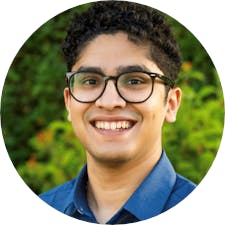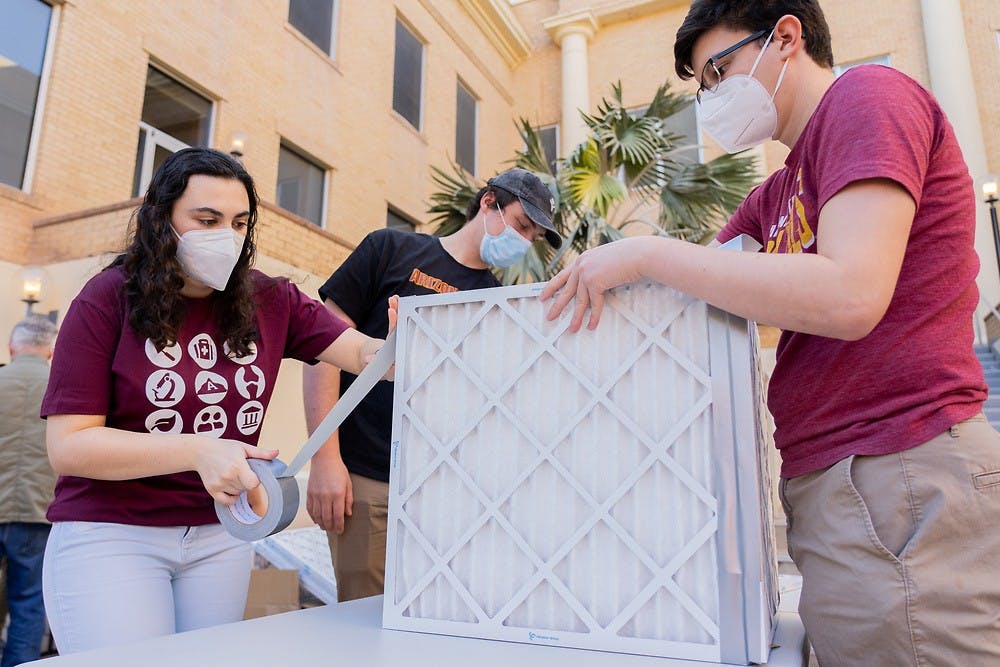ASU students are helping build air filters for K-12 classrooms across the Valley to combat COVID-19 transmission.
The filters, known as Corsi-Rosenthal boxes, are DIY air filtration boxes made simply by duct-taping four air filters together, fitting a fan on top, and covering the bottom with a piece of cardboard.
While researching the effects of the pandemic and the surge of omicron in December 2021, Megan Jehn, an epidemiologist and associate professor at the School of Human Evolution and Social Change (SHESC), recognized the need for countermeasures against the virus's spread as Arizona students went back to school in person.
After connecting with public health experts on Twitter, Jehn, who is also the leader of ASU's COVID-19 community response team and student outbreak response team, learned about the Corsi-Rosenthal boxes.
"Most schools couldn't afford the really expensive HEPA filters," Jehn said. "So, when I heard about the do-it-yourself, low-cost filter option, I was really intrigued and thought it could be something that had a really immediate impact on transmission in a school setting."
Jehn said, given the University's vast resources and experts, the project was something ASU was well positioned to partake in.
Volunteers have been recruited via outreach to student messaging groups, Jehn's and another instructor's classes, and a Google Form for interested volunteers.
K-12 school teachers can fill out a different Google Form to request a Corsi-Rosenthal filter. Jehn incorporated ASU student volunteers to help build the Corsi-Rosenthal boxes and deliver them to the schools that needed them.
Jehn and the student volunteers participated in box-a-thons outside SHESC, dedicated to building the Corsi-Rosenthal filters.
The volunteers deliver them to the schools, or teachers can pick them up the next day. Some teachers request student ambassadors to bring the necessary materials and teach them how to build the boxes themselves.
Corsi-Rosenthal boxes have been given to classrooms in school districts like ASU Prepatory Academy, Chandler Unified School District and Phoenix Union High School District.
Using money donated by the community, the volunteer team purchases the necessary supplies and often provides its own input as to how to improve the boxes.
Kaitlyn Takeno, a junior studying biochemistry and one of the project's lead volunteers, said the student volunteer effort has allowed the work to be efficient and diverse.
"I think it's really helpful that people from all majors are willing to help," Takeno said. "There are so many different things that goes into the project like marketing, buying supplies, to building."
Takeno said the process of creating the boxes was smooth and efficient, and that with Jehn's help and others around, the group was able to have fun creating something that is helping many classrooms.
"It's really important that if we have the opportunity to make it safer for the students that we do," said Ashlee Greenier, a senior studying global health and microbiology. "And I think it feels good in the end that we are taking our step and doing our part to help stop the spread of COVID."
Bailey Holmes, a freshman studying chemistry, said it was amazing that something she can build in five to 10 minutes had such an impact.
The group has already built over 130 Corsi-Rosenthal boxes over its limited sessions, Greenier said.
"We want to involve more of the community members," Takeno said. "Even K-12 faculty who are getting the boxes, ASU faculty and other ASU students can come as well. But we also need more funding because of how much demand there is for the boxes, and I think that the next step is to not only have more volunteers but student ambassadors as well."
With the demand for the boxes exceeding supply and funds, the team has been sending student ambassadors into schools to instruct teachers on how to build the boxes with the teachers' own materials.
Schools have already begun using the Corsi-Rosenthal boxes within their classrooms, often as teaching moments and STEM lessons for students.
Lisa Winghart, a biology and physics teacher at ASU Preparatory Academy South Phoenix High School, said that when the school's principal brought in the Corsi-Rosenthal box, she was excited to use it in her classroom to add an extra layer of protection and, with it, new learning material.
"When it got here, we talked about it and learned about how it worked," Winghart said. She also ordered materials for a new box. "When (the materials) get here, we are actually going to build it and talk about it and what it means to us as a class."
Winghart said her students were excited to be able to test the box in their classroom, and they even noticed a difference in air quality when it was on.
The high school plans to use more Corsi-Rosenthal boxes in the future and looks toward what's next, she said.
Jehn and the volunteer team said they are always looking for more volunteers, and they hope to continue providing schools with even more protection against COVID-19.
"Even the best HEPA filter cannot guarantee that you will be protected against airborne transmission," Jehn said. "But (these boxes) are part of a layered protection plan against the virus."
Reach the reporters at ljchatha@asu.edu and follow @LukeJC2 on Twitter.
Like The State Press on Facebook and follow @statepress on Twitter.

Luke Chatham is a Community & Culture reporter and previous Business and Tech reporter. He also worked in the studio production crew for Cronkite News and is currently a freelance reporter and writer for Arcadia News.




